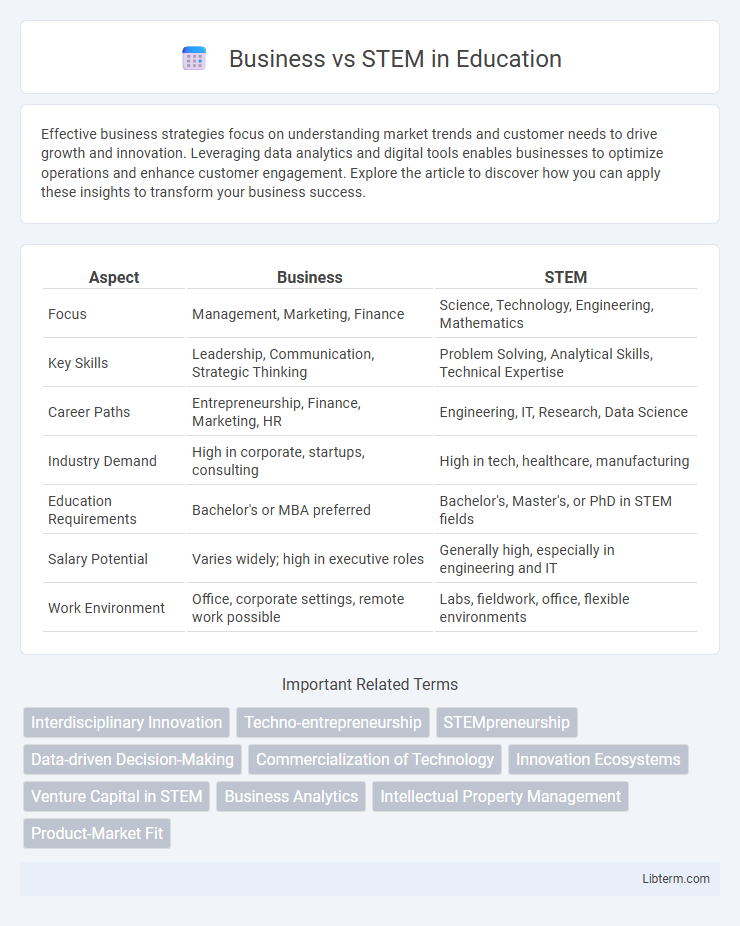Effective business strategies focus on understanding market trends and customer needs to drive growth and innovation. Leveraging data analytics and digital tools enables businesses to optimize operations and enhance customer engagement. Explore the article to discover how you can apply these insights to transform your business success.
Table of Comparison
| Aspect | Business | STEM |
|---|---|---|
| Focus | Management, Marketing, Finance | Science, Technology, Engineering, Mathematics |
| Key Skills | Leadership, Communication, Strategic Thinking | Problem Solving, Analytical Skills, Technical Expertise |
| Career Paths | Entrepreneurship, Finance, Marketing, HR | Engineering, IT, Research, Data Science |
| Industry Demand | High in corporate, startups, consulting | High in tech, healthcare, manufacturing |
| Education Requirements | Bachelor's or MBA preferred | Bachelor's, Master's, or PhD in STEM fields |
| Salary Potential | Varies widely; high in executive roles | Generally high, especially in engineering and IT |
| Work Environment | Office, corporate settings, remote work possible | Labs, fieldwork, office, flexible environments |
Introduction: Defining Business and STEM
Business encompasses activities related to trade, finance, marketing, and management aimed at generating profit and driving economic growth. STEM (Science, Technology, Engineering, and Mathematics) focuses on systematic study, innovation, and application of scientific and technical knowledge to solve complex problems. Both fields play crucial roles in shaping modern industries and fostering technological advancements.
Core Differences Between Business and STEM Fields
Business fields prioritize strategic decision-making, management, marketing, and financial analysis, emphasizing interpersonal skills and market-driven problem-solving. STEM disciplines focus on scientific methods, technical expertise, data analysis, and innovation through mathematics, engineering, and technology. While business centers on optimizing organizational performance and economic value, STEM drives technological advancement and empirical research development.
Education Pathways: Business vs STEM Degrees
Business degrees emphasize skills in management, finance, marketing, and entrepreneurship, preparing students for roles in corporate leadership, consulting, and financial analysis. STEM degrees concentrate on science, technology, engineering, and mathematics, fostering expertise in problem-solving, research, and technical innovation. Education pathways in Business often include internships and case studies, while STEM education incorporates laboratory work and technical projects to build practical competencies.
Skills Required for Success in Business and STEM
Success in business demands strong skills in leadership, strategic thinking, financial acumen, marketing expertise, and effective communication to drive growth and manage teams. STEM careers require proficiency in critical thinking, problem-solving, analytical reasoning, technical skills like coding or engineering, and continuous learning to innovate and adapt to technological advancements. Both fields benefit from adaptability and data-driven decision-making, but business emphasizes interpersonal skills while STEM focuses on technical expertise.
Career Opportunities in Business and STEM
Career opportunities in business span diverse sectors such as finance, marketing, management, and entrepreneurship, offering roles like financial analyst, marketing manager, and business consultant. STEM careers, encompassing science, technology, engineering, and mathematics, provide high-demand positions including software engineer, data scientist, and biomedical researcher, often accompanied by lucrative salaries and innovation-driven work environments. Both fields offer pathways for growth and specialization, with business careers emphasizing strategic decision-making and STEM careers focusing on technical expertise and problem-solving skills.
Salary and Job Market Trends
STEM careers consistently demonstrate higher median salaries, with fields like software engineering and data science exceeding $100,000 annually, reflecting strong demand in technology-driven markets. Business roles, while offering competitive pay in sectors such as finance and consulting, show more variability influenced by economic cycles and organizational performance. Job market trends indicate STEM occupations experience faster growth rates and lower unemployment compared to many business-related positions, driven by ongoing digital transformation and innovation needs.
Work Environment and Culture Comparison
Business careers typically feature dynamic, team-oriented work environments emphasizing communication, leadership, and client interaction, often within corporate offices or flexible remote settings. STEM roles prioritize innovation, problem-solving, and technical expertise, with workspaces ranging from laboratories and research facilities to tech hubs, fostering collaboration among specialists. Business culture values adaptability and market responsiveness, while STEM culture emphasizes precision, continuous learning, and data-driven decision-making.
Innovation and Impact: Contributions of Business and STEM
Business drives innovation by applying STEM advancements to market needs, creating scalable solutions that generate economic growth and job opportunities. STEM fields contribute groundbreaking technologies and scientific discoveries that form the foundation for new products and services, enhancing quality of life. The synergy between business acumen and STEM expertise accelerates impactful innovations, transforming industries and addressing global challenges.
Challenges and Growth Potential in Each Field
Business careers face challenges such as market volatility and the constant need to adapt to consumer behavior and economic trends, demanding strong strategic thinking and leadership skills. STEM fields confront rapid technological advancements and require continuous learning to keep pace with innovations in areas like artificial intelligence, biotechnology, and engineering. Growth potential in business is driven by entrepreneurship and global market expansion, while STEM offers immense opportunities through breakthroughs in technology and research, fostering sustainable development and high-demand careers.
Choosing the Right Path: Factors to Consider
Choosing between Business and STEM depends on career goals, personal interests, and market demand; Business majors often excel in leadership, finance, and entrepreneurship, while STEM fields emphasize technical skills, innovation, and problem-solving in areas like technology, engineering, and science. Salary potential and job growth trends indicate STEM careers generally offer higher starting salaries and faster employment growth, but business degrees provide versatility across industries such as marketing, consulting, and management. Evaluating educational commitment, learning style, and long-term professional aspirations is essential for making an informed decision aligned with individual strengths and market opportunities.
Business Infographic

 libterm.com
libterm.com